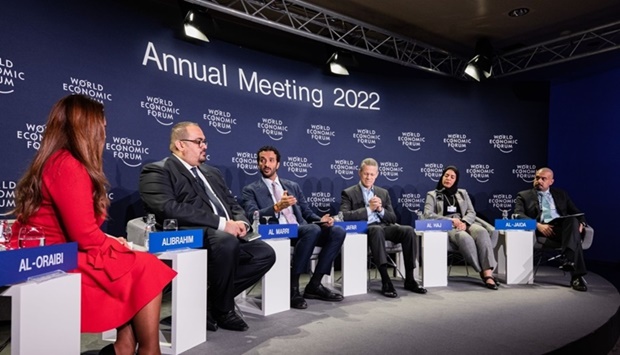The Qatar Financial Centre (QFC) has said the time has come to address the environmental and economic challenges urgently and effectively.
Speaking at a special session at the World Economic Forum annual meeting held in Davos, Switzerland recently; QFC Authority chief executive Yousuf Mohamed al-Jaida said the environmental and economic challenges confronting the world continue to be exacerbated by rising global temperature and regional conflicts, making life increasingly difficult in many parts of the world.
"Sustainable financial instruments such as green sukuk and bonds are powerful tools the financial sector can leverage to move the needle of climate change toward a more sustainable future," he said.
As part of its commitment to promote a sustainable financial market, the QFC developed sustainable sukuk and bonds framework (SSBF) to ensure that these financial instruments are fully utilised without compromising their integrity, he said.
The session “Transitioning to a Green Middle East”, a panel discussion examined the acute impact of climate change on the Middle East and North Africa region and explored the capacity of global and regional actors to strengthen the region’s climate resilience.
Speaking from a finance perspective, al-Jaida discussed the critical role of sustainable financing instruments, particularly sustainable sukuk and bonds, in moving towards a green economy and building a more environment friendly and sustainable world.
He also highlighted the importance of sound and well-structured guidelines, such as the SSBF the QFC introduced recently, to successfully develop a sustainable finance market and in preserving its integrity.
The QFC SSBF, the first in the GCC region, will promote appropriate disclosures of relevant information, reporting, and transparency concerning their issuance. The framework also ensures that these financial instruments meet their objectives and prevent risks of greenwashing.
Sheikha Alanoud bint Hamad al-Thani, deputy chief executive and chief business officer, QFC, positioned Qatar as a hub for business and talked about the QFC providing a world-class platform to support and further economic growth in the region.
QFC is an onshore jurisdiction that allows registered companies to enjoy competitive benefits, such as up to 100% foreign ownership, 100% repatriation of profits, 10% corporate tax on locally sourced profits, and an extensive double taxation treaty network with over 80 countries, a legal environment based on English common law and the right to trade in any currency.
Speaking at a special session at the World Economic Forum annual meeting held in Davos, Switzerland recently; QFC Authority chief executive Yousuf Mohamed al-Jaida said the environmental and economic challenges confronting the world continue to be exacerbated by rising global temperature and regional conflicts, making life increasingly difficult in many parts of the world.
"Sustainable financial instruments such as green sukuk and bonds are powerful tools the financial sector can leverage to move the needle of climate change toward a more sustainable future," he said.
As part of its commitment to promote a sustainable financial market, the QFC developed sustainable sukuk and bonds framework (SSBF) to ensure that these financial instruments are fully utilised without compromising their integrity, he said.
The session “Transitioning to a Green Middle East”, a panel discussion examined the acute impact of climate change on the Middle East and North Africa region and explored the capacity of global and regional actors to strengthen the region’s climate resilience.
Speaking from a finance perspective, al-Jaida discussed the critical role of sustainable financing instruments, particularly sustainable sukuk and bonds, in moving towards a green economy and building a more environment friendly and sustainable world.
He also highlighted the importance of sound and well-structured guidelines, such as the SSBF the QFC introduced recently, to successfully develop a sustainable finance market and in preserving its integrity.
The QFC SSBF, the first in the GCC region, will promote appropriate disclosures of relevant information, reporting, and transparency concerning their issuance. The framework also ensures that these financial instruments meet their objectives and prevent risks of greenwashing.
Sheikha Alanoud bint Hamad al-Thani, deputy chief executive and chief business officer, QFC, positioned Qatar as a hub for business and talked about the QFC providing a world-class platform to support and further economic growth in the region.
QFC is an onshore jurisdiction that allows registered companies to enjoy competitive benefits, such as up to 100% foreign ownership, 100% repatriation of profits, 10% corporate tax on locally sourced profits, and an extensive double taxation treaty network with over 80 countries, a legal environment based on English common law and the right to trade in any currency.

